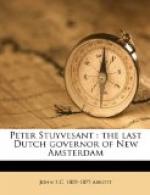Kieft sent to the chief of the tribe, demanding the murderer. The culprit Indian sent back the reply:
“When the fort was building some years ago, my uncle and I, carrying some beaver skins to the fort to trade, were attacked by some Dutchmen, who killed my uncle and stole the furs. This happened when I was a small boy. I vowed to revenge it upon the Dutch when I grew up. I saw no better chance than this of Claes Smits.”
The sachem refused to deliver up the criminal, saying that he had but done his duty, according to the custom of his race, in avenging the death of his kinsman, murdered many years before. Kieft was exceedingly embarrassed. He was very unpopular; was getting the colony deeper and deeper into difficulty, and was accused of seeking war with the Indians that he “might make a wrong reckoning with the Company.”
In this emergency, that others might share the responsibility with him, he reluctantly sought the counsel of the community. Twelve “select men” were chosen to consider the propositions to be submitted to them by the Director. To them the question was propounded:
“Is it not just, that the murder lately committed by a savage, upon Claes Smits, be avenged and punished? In case the Indians will not surrender the murderer, is it not just to destroy the whole village to which he belongs? In what manner, when, and by whom ought this to be executed?”
The result of their deliberations was, in brief, as follows:
“Our harvest is still ungathered; our cattle are scattered in the woods. Many of the inhabitants, unsuspicious of danger, are at a distance. It is not best to precipitate hostilities. In the meantime let two hundred coats of mail be procured in preparation for the expedition. Let our friendly intercourse with the savages be uninterrupted, to throw them off their guard. When the hunting season commences, let two armed bands be sent out to attack the Indians from opposite directions. Let as many negroes as can be spared, be sent on this expedition, each armed with tomahawk and half-pike. Still let messengers be sent once, twice and even a third time to solicit the surrender of the murderer.”
The Governor had the reputation of being an arrant coward. It had often been said, “It is very well for him to send us into the field, while he secures his own life in a good fort, out of which he has not slept a single night in all the years he has been here.” They therefore shrewdly added, “The Governor himself ought to lead the van in this attack. We will follow his steps and obey his commands.”
The hunting season soon came. Still it was decided to delay hostilities. The savages were on their guard. A very general feeling of unfriendliness pervaded the tribes. The Dutch settlers were widely scattered. A combination of the Indians against the colonists might prove an awful calamity. Thus, for a time, the war which was evidently approaching was averted.




